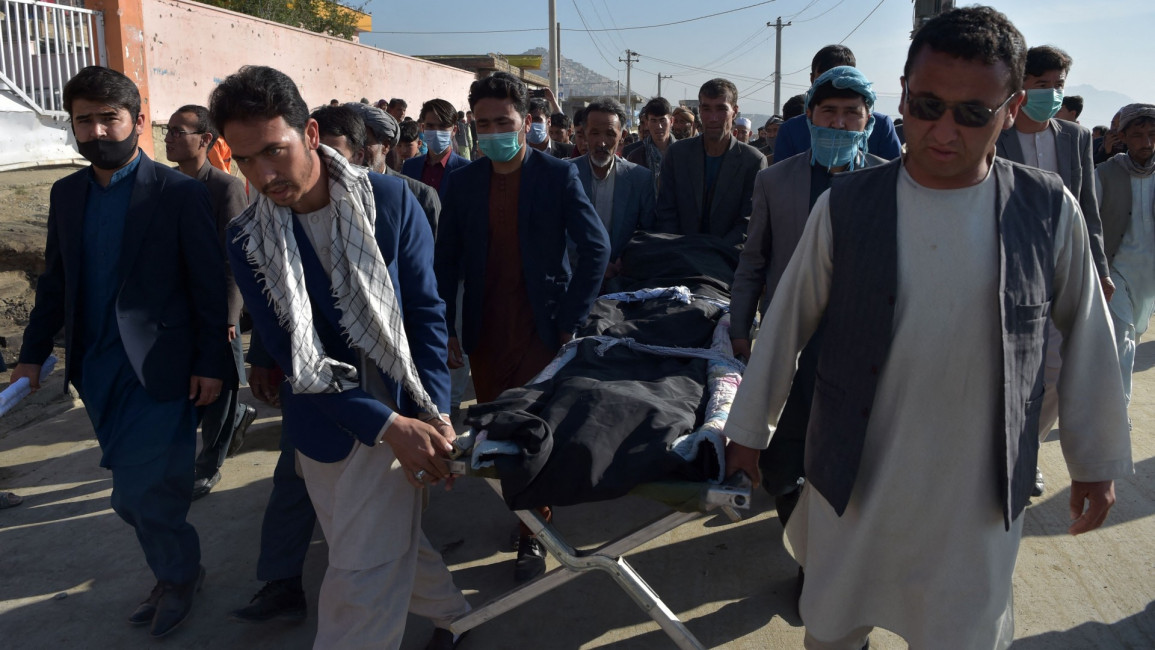Follow us on Facebook, Twitter and Instagram to stay connected
Afghans begin burying dead from bloody school blasts, as death toll rises to 50
Dozens of young girls were being buried Sunday at a desolate hilltop cemetery in Kabul, a day after a secondary school was targeted in the bloodiest attack in Afghanistan in over a year.
A series of blasts outside the school during a peak holiday shopping period killed more than 50 people, mostly girl students, and wounded over 100 in Dash-e-Barchi, a west Kabul suburb populated mostly by Hazara Shias.
The government blamed the Taliban for the carnage, but the insurgents denied responsibility and issued a statement saying the nation needed to "safeguard and look after educational centres and institutions".
Saturday's blasts came as the United States military continues to pull out its last 2,500 troops from the violence-wracked country despite faltering peace efforts between the Taliban and Afghan government to end a decades-long war.
Interior Ministry spokesman Tareq Arian told reporters that a car bomb detonated in front of the Sayed Al-Shuhada girls school on Saturday, and when the students rushed out in panic, two more devices exploded.
Residents were shopping ahead of this week's Eid al-Fitr holiday, which marks the end of Islamic holy month of Ramadan, when the blasts occurred.
On Sunday, relatives began burying the dead at a hilltop site known as "Martyrs Cemetery", where victims of attacks against the Hazara community are laid to rest.
Hazaras are Shia Muslims and considered heretic by extremist Sunnis. Sunni Muslims make up the majority of the Afghan population.
Afghan officials including President Ashraf Ghani blamed the Taliban.
"This savage group does not have the power to confront security forces on the battlefield, and instead targets with brutality and barbarism public facilities and the girls' school," Ghani said in a statement after the blasts.
Taliban chief warns US
|
The Taliban denied involvement, and insist they have not carried out attacks in Kabul since February last year, when they signed a deal with Washington that paved the way for peace talks and withdrawal of the remaining US troops.
But the group has clashed daily with Afghan forces in the rugged countryside even as the US military reduces its presence.
The United States was supposed to have pulled all forces out by May 1 as agreed with the Taliban last year, but Washington pushed back the date to September 11 -- a move that angered the insurgents.
The leader of the Taliban, Haibatullah Akhundzada, reiterated in a message released ahead of Eid that any delay in withdrawing the troops was a "violation" of that deal.
"If America again fails to live up to its commitments then the world must bear witness and hold America accountable for all the consequences," Akhundzada warned in Sunday's message.
He said also that the nation should give particular attention to the healthy and literate growth of children.
The nation "must safeguard and look after educational centres and institutions", he said.
The top US diplomat in Kabul, Ross Wilson, called Saturday's blasts "abhorrent".
"This unforgivable attack on children is an assault on Afghanistan's future, which cannot stand," Wilson tweeted.
The Dasht-e-Barchi neighbourhood has been a regular target of attacks from Sunni Islamist militants.
In May last year, a group of gunmen launched a brazen daylight raid on a hospital in the area that left 25 people dead, including 16 mothers of newborn babies.
Ghani had blamed the Taliban and the jihadist Islamic State group for that attack.
On October 24, a suicide bomber blew himself up at a tuition centre in the same district, killing 18 people in an attack that was claimed by IS.


![President Pezeshkian has denounced Israel's attacks on Lebanon [Getty]](/sites/default/files/styles/image_684x385/public/2173482924.jpeg?h=a5f2f23a&itok=q3evVtko)



 Follow the Middle East's top stories in English at The New Arab on Google News
Follow the Middle East's top stories in English at The New Arab on Google News


